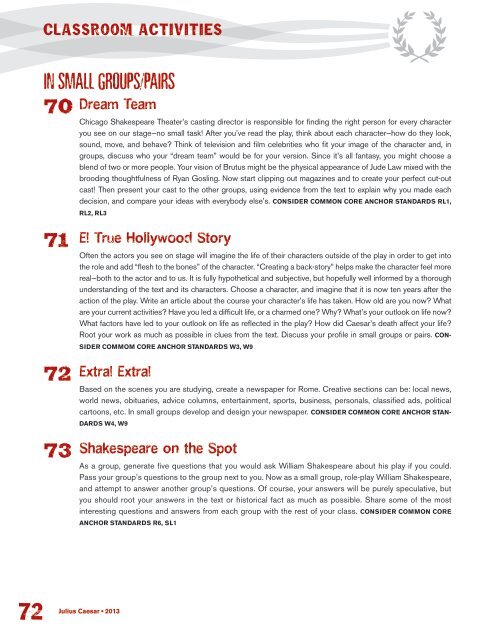Julius Caesar • 2013 - Chicago Shakespeare Theater
Julius Caesar • 2013 - Chicago Shakespeare Theater
Julius Caesar • 2013 - Chicago Shakespeare Theater
Create successful ePaper yourself
Turn your PDF publications into a flip-book with our unique Google optimized e-Paper software.
72<br />
CLASSROOM ACTIVITIES<br />
IN SMALL GROUPS/PAIRS<br />
70 Dream Team<br />
71<br />
72<br />
73<br />
<strong>Chicago</strong> <strong>Shakespeare</strong> <strong>Theater</strong>’s casting director is responsible for finding the right person for every character<br />
you see on our stage—no small task! After you’ve read the play, think about each character—how do they look,<br />
sound, move, and behave? Think of television and film celebrities who fit your image of the character and, in<br />
groups, discuss who your “dream team” would be for your version. Since it’s all fantasy, you might choose a<br />
blend of two or more people. Your vision of Brutus might be the physical appearance of Jude Law mixed with the<br />
brooding thoughtfulness of Ryan Gosling. Now start clipping out magazines and to create your perfect cut-out<br />
cast! Then present your cast to the other groups, using evidence from the text to explain why you made each<br />
decision, and compare your ideas with everybody else’s. CONSIDER COMMON CORE ANCHOR STANDARDS RL1,<br />
RL2, RL3<br />
E! True Hollywood Story<br />
Often the actors you see on stage will imagine the life of their characters outside of the play in order to get into<br />
the role and add “flesh to the bones” of the character. “Creating a back-story” helps make the character feel more<br />
real—both to the actor and to us. It is fully hypothetical and subjective, but hopefully well informed by a thorough<br />
understanding of the text and its characters. Choose a character, and imagine that it is now ten years after the<br />
action of the play. Write an article about the course your character’s life has taken. How old are you now? What<br />
are your current activities? Have you led a difficult life, or a charmed one? Why? What’s your outlook on life now?<br />
What factors have led to your outlook on life as reflected in the play? How did <strong>Caesar</strong>’s death affect your life?<br />
Root your work as much as possible in clues from the text. Discuss your profile in small groups or pairs. CON-<br />
SIDER COMMOM CORE ANCHOR STANDARDS W3, W9<br />
Extra! Extra!<br />
Based on the scenes you are studying, create a newspaper for Rome. Creative sections can be: local news,<br />
world news, obituaries, advice columns, entertainment, sports, business, personals, classified ads, political<br />
cartoons, etc. In small groups develop and design your newspaper. CONSIDER COMMON CORE ANCHOR STAN-<br />
DARDS W4, W9<br />
<strong>Shakespeare</strong> on the Spot<br />
As a group, generate five questions that you would ask William <strong>Shakespeare</strong> about his play if you could.<br />
Pass your group’s questions to the group next to you. Now as a small group, role-play William <strong>Shakespeare</strong>,<br />
and attempt to answer another group’s questions. Of course, your answers will be purely speculative, but<br />
you should root your answers in the text or historical fact as much as possible. Share some of the most<br />
interesting questions and answers from each group with the rest of your class. CONSIDER COMMON CORE<br />
ANCHOR STANDARDS R6, SL1<br />
<strong>Julius</strong> <strong>Caesar</strong> <strong>•</strong> <strong>2013</strong>




